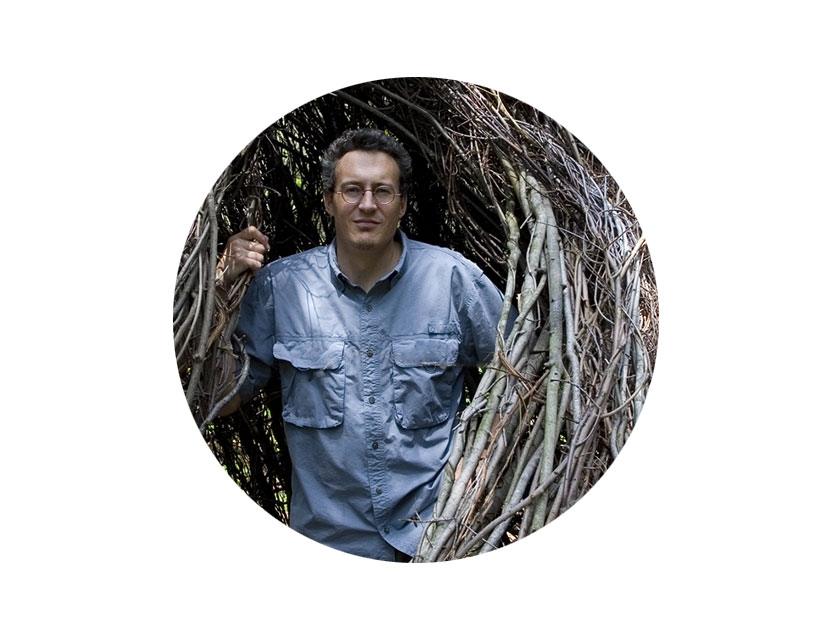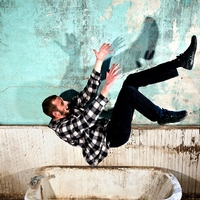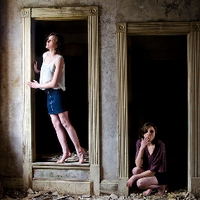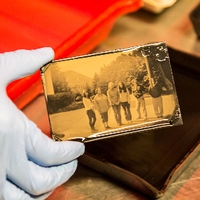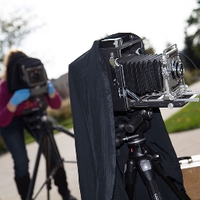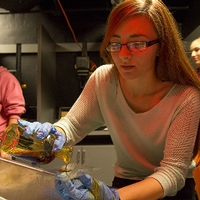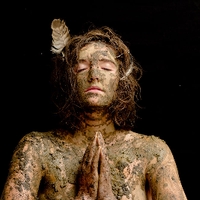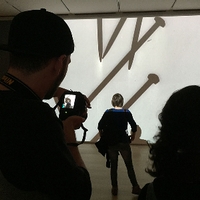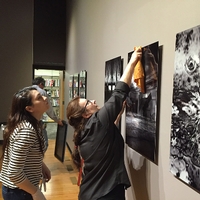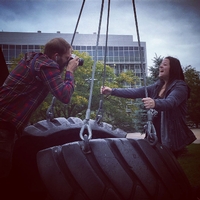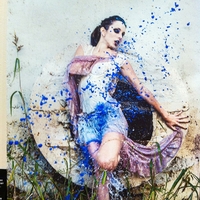Photography
Senior Thesis Show is online now
Take a look at the proud portfolios of eight of our majors who have created this work as the summation of what they have learned here at Grand Valley. Due to the COVID-19 outbreak the exhibition of this work will be delayed until fall.
Studies in Photography at Grand Valley State University encompass the history, critical and aesthetic theory, and varied practice of photography as a medium of visual communication and expression in culture and society.
As in all forms of communication, the study of photography requires that students synthesize analytical and creative capacities and apply them to the critical interpretation and creative production of meaning. Mastery in photography requires an understanding of the visual language of the medium, the acquisition of technique, and a disposition of intellectual curiosity.
To be a Photographer
This short video will give you a glimpse at the daily goings on in the photography program
GVSU Photography Program Video
Degree Options
BA/BS in Photography
The B.A. and B.S. degrees prepare students to engage graduate studies in fine art programs, begin careers as professional artists, work creatively in commercial advertising and portrait studios, produce compelling work as photojournalists and editorial photographers, apply their expertise in museums and galleries, or combine a knowledge of image-making with another field for a variety of interests and functions.
Bachelor of Arts/ Bachelor of Sciences, Photography – Information
Minor In Photography
The Photography minor offers students in other majors the opportunity to pursue their interest in photography. Students take seven courses for the minor for a minimum of 21 credits
Why Photography at GVSU?
A dedication to the education of intelligent image-makers that is neither constrained in a vocational training program, nor a narrow studio art emphasis alone, is what makes the photography program at Grand Valley distinct and valued in the state and region.
- The school has many ties with business, community, and cultural organizations, and has contacts with experts in a variety of areas in communications, which serve as outstanding resources both within the classroom and for internships.
- The diversity of courses offered allows students the opportunity to explore a variety of photographic methods and applications as they develop their personal expertise and interests.
- The program prepares students to engage graduate studies in fine art programs.
- Faculty in photography have a broad range of professional experience and a dedication to teaching.
Learning Environment
The photography program offers high-quality, student-centered, production and theory courses aimed at developing liberally educated professionals able to thoughtfully adapt and thrive in a variety of professional and creative environments.
As meaning-makers, students need to combine photographic technique and their understanding of visual language with ideas that emanate from an authentic sense of self. The individuality and integrity of the photographer are essential grounds for the self-governance and success of any artist and professional. Although the photographer needs expertise in the practice, history, and critical study of photography, these are rarely the content of the photographs they make which operate as densely-coded objects in a system of cultural discourse. Breadth and depth in studies in a variety of fields contribute to the intellectual life of a photographer and his or her understanding of the cultural, political, social, ethical, economic, aesthetic, and psychological uses of images. This dedication to the education of intelligent image-makers that is neither constrained in a vocational training program, nor a narrow studio art emphasis alone, is what makes the photography program at Grand Valley distinct and valued in the state and region.



Faculty

Ashlee McGreevy
Visiting Professor
Stafford Smith
Associate Professor
Photography Internship Coordinator
Anthony Thompson
Professor
Victoria Veenstra
Associate Professor
Students' Works
Course Catalog
An introductory course in the use of the still camera and in the
essentials of black-and-white darkroom photography. Emphasis on the
basic aesthetics and techniques that underlie photographic
communication. Offered every semester. Access to a 35mm film camera,
with manual control option, required.
Credits: 4
The aesthetic and technical concepts beyond basic photography.
Emphasis on fine-tuning black-and-white negative and printing methods,
including the zone system. Students register for one lab section in
addition to lecture. Access to 35mm camera, with manual control
option, required. Offered every semester. Prerequisite: CPH 171.
Credits: 3
An introductory course in still photography without darkroom instruction. Covers camera operation, composition, aesthetics, image manipulation, and visual communication. Access to a digital camera with manual exposure controls is required. Counts toward the photography minor, but not the major. Fulfills Foundation - Arts. Offered fall and winter semesters. 3 credits
A survey of the origins and developmental phases of photography.
Technical innovations will be examined, but emphasis will be on the
historical motivations and changing climates of aesthetic intent,
philosophical rationale, and visual experimentation in the history of
photography from the early 19th century to the present. Offered fall semester.
Credits: 3
Introduction to the use of computers in photography with emphasis on
digital image processing. Students will gain experience with hardware
and software used to access, manipulate, and output photographs for
use in display, print, and the digital environment. Offered every
semester. Prerequisites: ART 149 or 150 and one of the following: CPH
175, CPH 172, CFV 226, or permission of instructor.
Credits: 3
Emphasis upon the use and application of the large format camera, the
zone system of previsualization and exposure/development control, and
the production of the classic black and white print. Subject areas
represent the classic themes drawn from the history of photography.
Offered fall and winter semesters. Prerequisite: CPH 172 or permission
of instructor.
Credits: 3
Introduction to color theory and expressive use of color in
photography. Offered fall semesters. Prerequisite: CPH 272.
Credits: 3
A study of topics not regularly covered in the curriculum. May be repeated for credit when topic varies. Prerequisite: Sophomore standing or permission of instructor. One to three credits.
An examination of the principle theories and debates in photography
from the early 19th century to the present, their social and political
contexts, and their expression in both photographic practice and
critical writings. Offered winter semester. Prerequisites: CPH 266 and
junior standing; or permission of the instructor.
Credits: 3
An advanced production course that investigates experimental and
nontraditional applications of black-and-white imaging materials and
processes. Historical and contemporary experimental work will be
examined. Emphasis is on the expressive and visual significance of
experimentally generated imagery. Offered winter semester.
Prerequisite: CPH 273.
Credits: 3
An exploration of the history, contemporary trends, and future
possibilities of digital imaging processes. Includes an examination of
visual communication within the digital environment. Student readings
and discussions will be augmented with digital imaging projects.
Offered winter semester. Prerequisite: CPH 272 or permission of instructor.
Credits: 3
An advanced course emphasizing various approaches to color
photographic image making. Areas of investigation include color
theory, color and perception, color and light, color strategies, and
color as image, as well as contemporary trends in color photography.
Offered winter semester. Prerequisite: CPH 279 or permission of instructor.
Credits: 3
Creation of studio still-lifes, artificial studio lighting, and principles of studio portraiture. All work done with digital photography. Prerequisite: CPH 272.
Credits: 3
Explores the photographic tradition of the social documentary.
Practical emphasis on black-and-white image making depicting people:
their activities, relationships, conditions. (Color slides optional
with permission of instructor.) Photo essays will be produced. Lab to
be arranged. Offered fall semester, even-numbered years. Prerequisite:
CPH 272.
Credits: 4
An intensive investigation and a sustained image-making activity in
one area of photographic practice. Examines both historical and
contemporary approaches, as well as aesthetic and cultural attitudes
that have informed them. Students will produce various solutions
within the course theme. Offered fall semester. Prerequisite: CPH 272
Credits: 3
A study of topics not regularly covered in the curriculum. May be repeated for credit when topic varies. Prerequisite: Junior standing or permission of instructor. One to three credits.
An experience of an essentially scholarly and/or creative nature
undertaken by a student under the supervision of one or more faculty
members. Initiated by the student who has a special interest in a
subject that is not available in the current curriculum. The student
and the faculty sponsor agree on the scope of the study, its
components, and methods of evaluation. Offered every semester.
Credits: 1 to 6
A study of topics not regularly covered in the curriculum. May be repeated for credit when topic varies. Prerequisite: Senior standing or permission of instructor. One to three credits.
A supervised work experience in an area of a student’s potential
career interest. Initiated by the student, who plans the work
experience with the advisor, the faculty sponsor chosen to supervise
the internship, and the supervisor at the worksite. Credit is awarded
only when the student, the faculty sponsor, and the work supervisor
have completed evaluations of the internship. Offered every semester.
Credits: 1 to 6
A culminating course in which students demonstrate their conceptual
understanding and creative abilities in photography and visual
communication. Each student develops a coherent body of work and a
thesis paper reflecting on that work from a personal, historical, and
critical perspective. Offered fall and winter semesters, but not
necessarily in the summer. Prerequisites: CPH 266 with a grade of C or
better and CPH 366.
Credits: 1 to 6
Visit Us
Prospective Students are invited to attend one of the High School Student Receptions, held throughout the academic year. Receptions follow the Laker Experience Days.
Request Information
For questions about the Photography area, please contact:
Anthony Thompson
Photography Coordinator
104 Lake Michigan Hall
(616) 331-3606
Other Areas
Art Education — Art History — Ceramics — Film & Video Production — Graphic Design — Illustration — Jewelry and Metalsmithing — Painting — Photography — Printmaking — Sculpture — Visual Studies




